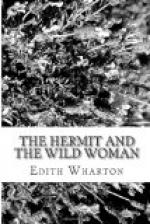But, with the cry on my lips, my diagnosis suffered an unexpected check.
“This is my own lair,” he said, leading me into a dark plain room at the end of the florid vista. It was square and brown and leathery: no “effects”; no bric-a-brac, none of the air of posing for reproduction in a picture weekly—above all, no least sign of ever having been used as a studio.
The fact brought home to me the absolute finality of Jack’s break with his old life.
“Don’t you ever dabble with paint any more?” I asked, still looking about for a trace of such activity.
“Never,” he said briefly.
“Or water-colour—or etching?”
His confident eyes grew dim, and his cheeks paled a little under their handsome sunburn.
“Never think of it, my dear fellow—any more than if I’d never touched a brush.”
And his tone told me in a flash that he never thought of anything else.
I moved away, instinctively embarrassed by my unexpected discovery; and as I turned, my eye fell on a small picture above the mantel-piece—the only object breaking the plain oak panelling of the room.
“Oh, by Jove!” I said.
It was a sketch of a donkey—an old tired donkey, standing in the rain under a wall.
“By Jove—a Stroud!” I cried.
He was silent; but I felt him close behind me, breathing a little quickly.
“What a wonder! Made with a dozen lines—but on everlasting foundations. You lucky chap, where did you get it?”
He answered slowly: “Mrs. Stroud gave it to me.”
“Ah—I didn’t know you even knew the Strouds. He was such an inflexible hermit.”
“I didn’t—till after. . . . She sent for me to paint him when he was dead.”
“When he was dead? You?”
I must have let a little too much amazement escape through my surprise, for he answered with a deprecating laugh: “Yes—she’s an awful simpleton, you know, Mrs. Stroud. Her only idea was to have him done by a fashionable painter—ah, poor Stroud! She thought it the surest way of proclaiming his greatness—of forcing it on a purblind public. And at the moment I was the fashionable painter.”
“Ah, poor Stroud—as you say. Was that his history?”
“That was his history. She believed in him, gloried in him—or thought she did. But she couldn’t bear not to have all the drawing-rooms with her. She couldn’t bear the fact that, on varnishing days, one could always get near enough to see his pictures. Poor woman! She’s just a fragment groping for other fragments. Stroud is the only whole I ever knew.”
“You ever knew? But you just said—”
Gisburn had a curious smile in his eyes.
“Oh, I knew him, and he knew me—only it happened after he was dead.”
I dropped my voice instinctively. “When she sent for you?”
“Yes—quite insensible to the irony. She wanted him vindicated—and by me!”




